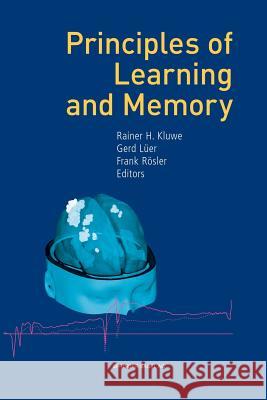Principles of Learning and Memory » książka



Principles of Learning and Memory
ISBN-13: 9783034894111 / Angielski / Miękka / 2012 / 358 str.
Principles of Learning and Memory
ISBN-13: 9783034894111 / Angielski / Miękka / 2012 / 358 str.
(netto: 191,66 VAT: 5%)
Najniższa cena z 30 dni: 192,74
ok. 16-18 dni roboczych.
Darmowa dostawa!
Principles of Learning and Memory presents state-of-the-art reviews that cover the experimental analysis of behavior, as well as the biological basis of learning and memory, and that overcome traditional borders separating disciplines. The resulting chapters present and evaluate core findings of human learning and memory that are obtained in different fields of research and on different levels of analysis. The reader will acquire a broad and integrated perspective of human learning and memory based on current approaches in this domain.
Wydanie ilustrowane
Short List of Contents(.-) Contents(.-) Preface(.-) A. FORMATION OF MEMORIES(.-) 1. The Principle of Contiguity (Harald Lachnit)(.-) Historical Antecedents: Philosophical Roots and Early Psychology(.)Empirical Departures from the Omnipotent Law of Contiguity(.)Theoretical Attempts to Retain the Law of Contiguity(.)Further Empirical Challenges to the Law of Contiguity(.)Competition Protects the Principle of Contiguity(.)Contiguity of Memory Traces(.)Back to the Significance of Contiguity for Learning(.)The Behavioral Expression of an Association Needs More Than Contiguity(.)Renouncing Contiguity in Favor of Time and Rate?(.-) 2. The Principle of Learning Based on Multiple Brain Structures (Thomas Kress and Irene Daum)(.-) Classical Conditioning as a Model System in the Neurobiology of Learning(.)Neuroanatomical Basis of Delay Conditioning(.)The Role of the Hippocampus(.)The Role of the Cerebellum(.)The Role of the Basal Ganglia(.)Brain Substrates of Complex Conditioning(.)Cerebellar-Hippocampal Interactions(.)Neuropsychological Studies in Patients with Damage to the Hippocampal System(.)Cerebellar-Prefrontal Interactions(.)Recent Developments(.)Conclusion(.-) 3. The Principle of Brain Plasticity (Brigitte Röder & Frank Rösler)(.-) Training-Induced Plasticity(.) Somatosensory System(.)Auditory System(.)Visual System(.)Motor System(.)Effects of enriched environments(.)Mechanisms(.)Lesion-Induced Plasticity(.)Intramodal Plasticity after Partial Deafferentiation(.) Intermodal Plasticity after Totally Deafferenting One Sensory System(.)Differences between Developmental and Adult Plasticity(.-) 4. The Principle of Emotional Learning (Gerhard Roth)(.-) Studies on the Interaction between Memory and Emotional States(.)The Memory System Inside the Brain(.)What are Emotions and Where do they Originate in the Brain?(.)The Neuronal Basis of Interaction between Memory and Emotion(.)The Role of Stress on Memory(.)CellularMechanisms of the Interaction between Memory and Emotions(.)Conclusion(.-) B. ORGANIZATION OF MEMORIES(.-) 5. The Principle of Code-Specific Memory Representations (Frank Rösler and Martin Heil)(.-) Empirical Foundations(.)Theoretical Foundations(.)Findings from Brain Imaging Studies(.)Spatial and Verbal Working Memory(.)Spatial and Object Working Memory(.)Long-term Memory for Verbal, Spatial, Color, and Motor Associations(.)Category-specific Representations(.)Conclusion(.-) 6. The Principle of Multiple Memory Systems (Axel Buchner and Martin Brandt)(.-) Distinct Memory Systems(.)Levels of Distinction(.)Working Memory(.)Modular Working Memory(.)Working Memory as Activated Memory(.)A Formal Model of Working Memory: The Feature Model(.)Summary of Working Memory Models(.)Long-Term Memory(.)Declarative versus Non-declarative Memory(.)Explicit versus Implicit Memory Measurement(.)Episodic versus Semantic Memory(.)Global Memory Models(.)Conclusion: Limits of the Principle of Multiple Memory Systems(.-) 7. Modules of Working Memory (John Jonides, Ching-Yune C. Sylvester, Steven C. Lacey, Tor D. Wager, Thomas E. Nichols, and Edward Awh)(.-) Verbal versus Spatial Storage(.)Rehearsal(.)Executive Mechanisms(.)Conclusion(.-) C. CONSOLIDATION OF MEMORIES(.-) 8. The Principle of Memory Consolidation and Its Pharmacological Modulation (Rainer K.W. Schwarting)(.-) The Consolidation Hypothesis and Its Origins(.)Experimental Procedures for Post-Trial Designs(.)Inhibitory Avoidance(.)Habituation of Exploration and Other Designs(.)Specific Aspects of Post-Trial Designs(.)Pharmacological Manipulations of Consolidation(.)An Example for a Pharmacological Post-Trial Approach: Cholinergic Manipulations in the Nucleus Accumbens of the Laboratory Rat(.)Brief Anatomy of the Nucleus Accumbens(.)Transmitters in the Nucleus Accumbens(.)Cholinergic Activity in the Nucleus Accumbens(.)Evidence for a Role of the Nucleus Accumbens in Mnestic
Frank Rösler ist Professor für Allgemeine und Biologische Psychologie und Experte auf dem Gebiet der kognitiven Psychophysiologie. Er lehrte viele Jahre am Fachbereich Psychologie der Philipps-Universität Marburg und ist seit 2010 am Department für Psychologie der Universität Potsdam tätig. Er hat an internationalen Institutionen geforscht und gelehrt, darunter University of California, University of Queensland, das Max-Planck-Institut für Psycholinguistik in Nijmegen, das Wissenschaftskolleg zu Berlin und das Hanse-Wissenschaftskolleg. Er ist Ehrenmitglied und Träger der Wilhelm-Wundt-Medaille der Deutschen Gesellschaft für Psychologie, gehört der Berlin-Brandenburgischen Akademie der Wissenschaften und der Leopoldina Nationale Akademie der Wissenschaften an, und er arbeitet als Beirat unter anderem am Max-Planck Institut für Bildungsforschung und für die Zeitschrift Gehirn und Geist. Gerd Lüer, geb. 1938, ist Professor für Psychologie in Göttingen. Arbeitsschwerpunkte: Experimentelle Psychologie, Kognitive Prozesse wie Gedächtnis- und Denkvorgänge, Genese, Aufbau und Nutzung von Wissen, Informationsverarbeitung beim Menschen.
Principles of Learning and Memory focuses on the most actual and central phenomena, which are discussed from an interdisciplinary point of view in five sections: formation, organization, consolidation, control, and adaptive specialization of memories. The editors’ intention is to present state-of-the-art reviews that cover the experimental analysis of behavior, as well as the biological basis of learning and memory, and that overcome traditional borders separating disciplines. The authors met in March 2001 for a three-day conference, where they discussed their planned contributions. The resulting chapters present and evaluate core findings of human learning and memory that are obtained in different fields of research and on different levels of analysis (e.g., cellular, neural network, behavioral level). The volume provides an integrated pattern of results wherever this is possible. The reader will acquire a broad and integrated perspective of human learning and memory based on current approaches in this domain.
Principles of Learning and Memory is a textbook for researchers and advanced students in biology, cognitive psychology, neuroscience, and cognitive science.
Features and benefits:
- Combines well-established central principles and phenomena and current approaches from cognitive science, neuroscience, and biology to emphasize connections between the findings in these different domains of research
- Takes into account results from empirical research and modeling approaches
- The contents are grouped into five sections:
A. Formation of Memories
B. Organization of Memories
C. Consolidation of Memories
D. Control of Memories
E. Adaptive Specialization of Memories
- Contains an integrated bibliography, a name index, and a subject index
- The editors and authors are well known scientists, who have made significant contributions to the field of learning and memory
1997-2026 DolnySlask.com Agencja Internetowa
KrainaKsiazek.PL - Księgarnia Internetowa









